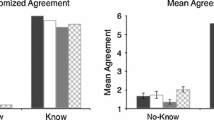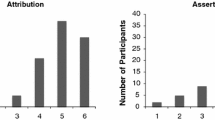Abstract
The knowledge account of assertion—roughly: one should not assert what one does not know—aspires to identify the norm distinctive of assertion. One main argument given in support of the knowledge account has been the success with which it explains a variety of Moore-paradoxical assertion. But that explanation does not generalize satisfactorily.
Similar content being viewed by others
Notes
See Unger (1975, pp. 256–260); Jones (1991, pp. 185–186); DeRose (1991, pp. 597–598, 2002, pp. 180–181); Williamson (1996, pp. 506–507, 2000, pp. 253–254); Hawthorne (2004, pp. 21–24). Compare Hintikka (1962, pp. 78–79). DeRose (2002, p. 180) says, “to my thinking one of the most important recommendations of the account [is] that it provides a nice handling of the knowledge version of Moore’s paradox and other troubling conjunctions.” For additional sympathetic discussion of the knowledge account, see also García-Carpintero (2004), Reynolds (2002), Slote (1979), and Stanley (2005).
Moore (1962, p. 277) says that “by asserting p positively, you imply, though you don’t assert, that you know that p”; see also Moore (1942, pp. 542–543). Because of Grice’s distinction between “implies” and “implicates,” Moore’s use of “imply” is better reproduced, in contemporary jargon, with the general “represents.”
Notice that, even if one accepts
(Moore) one represents oneself as knowing what one asserts,
this entails
(knowledge) one should not assert what one does not know
only if
(truth) one should not represent what is not true.
Even if in assertion one represents oneself as knowing, unless one should not represent what is not true, there will not yet be anything wrong with asserting what one does not know (and thus falsifying what one therein represents). So Moore’s insight converts into the knowledge account only given a thesis, itself controversial, about norms of representation that is effectively (assuming assertion is just a variety of representation) a competitor—the truth norm of assertion (see, e.g., Weiner 2005)—to the norm of assertion being defended as characteristic of assertion. Even without (truth) however, (Moore) could account for the oddity of (1): whatever the normative status of such an act, assertion of (1) involves explicitly denying what one would in a way also represent as true.
(1996, p. 506fn11) and (2002, p. 254), both citing Sorenson (1988, pp. 15–56).
This is equivalent to “p but I don’t know that I know that p and I don’t know that I don’t know that p.” The weaker but less-colloquial “p but I don’t know that I know that p” would serve as well.
See, for example, Weiner (2005); Douven (2006); Stone (2007); Lackey (2007); Kvanvig (forthcoming).
References
DeRose, K. (1991). Epistemic possibilities. Philosophical Review, 100, 581–605.
DeRose, K. (2002). Assertion, knowledge, and context. Philosophical Review, 111, 167–203.
Douven, I. (2006). Assertion, knowledge, and rational credibility. Philosophical Review, 115, 449–485.
García-Carpintero, M. (2004). Assertion and the semantics of force-markers. In C. Bianchi (Ed.), The semantics/pragmatics distinction. Palo Alto, CA: CSLI Publications.
Hawthorne, J. (2004). Knowledge and lotteries. Oxford: Clarendon Press.
Hintikka, J. (1962). Knowledge and belief. Ithaca: Cornell University Press.
Jones, O. R. (1991). Moore’s paradox, assertion and knowledge. Analysis, 51, 183–186.
Kvanvig, J. (forthcoming). Assertion, knowledge, and lotteries. In D. Pritchard, P. Greenough (Eds.), Williamson and his critics. Oxford: Oxford University Press.
Lackey, J. (2007). Norms of assertion. Noûs, 41, 594–626.
Moore, G. E. (1942). A reply to my critics. In P. A. Schilpp (Ed.), The philosophy of G. E. Moore. Evanston, IL: Northwestern University Press.
Moore, G. E. (1962). Commonplace book: 1919–1953. London: George Allen & Unwin, Ltd.
Reynolds, S. (2002). Testimony, knowledge, and epistemic goals. Philosophical Studies, 110, 139–161.
Slote, M. (1979). Assertion and belief. In J. Dancy (Ed.), Papers on language and logic. Keele: Keele University Library.
Sorenson, R. (1988). Blindspots. Oxford: Clarendon Press.
Stanley, J. (2005). Knowledge and practical interests. Oxford: Clarendon Press.
Stone, J. (2007). Contextualism and warranted assertion. Pacific Philosophical Quarterly, 88, 92–113.
Unger, P. (1975). Ignorance. Oxford: Clarendon Press.
Weiner, M. (2005). Must we know what we say? Philosophical Review, 114, 227–251.
Williamson, T. (1996). Knowing and asserting. Philosophical Review, 105, 489–523.
Williamson, T. (2000). Knowledge and its limits. Oxford: Oxford University Press.
Author information
Authors and Affiliations
Corresponding author
Rights and permissions
About this article
Cite this article
Sosa, D. Dubious assertions. Philos Stud 146, 269–272 (2009). https://doi.org/10.1007/s11098-008-9255-8
Received:
Accepted:
Published:
Issue Date:
DOI: https://doi.org/10.1007/s11098-008-9255-8




